初中英语语法知识—非谓语动词的知识点训练(4)
初中英语语法非谓语动词

It is good of you to help me with my English. 你真好,帮助我学英语。 (强调you的特征=You are good to help me.) It is good for you to give up smoking. 戒烟对你有好处。 (强调的是give up smoking这一行为= For you to give up smoking is good.)
F、作定语(必须后置)
I have something to say . It’s the best way to help him .
1、had better 后 2、使让动词 make , let , have 用于主动语态时。 3、感官动词see, hear , watch , feel , notice 用在 “经常”的主动语态时。
Looking at a crowded street Listening to my own heart beat So many people all around the world Tell me where do I find someone like you girl Take me to your heart take me to your soul Give me your hand before I’m old Show me what love is - haven’t got a clue Show me that wonders can be true They say nothing lasts forever We’re only here today Love is now or never Bring me far away Take me to your heart take me to your soul Give me your hand and hold me Show me what love is - be my guiding star It’s easy take me to your heart Standing on a mountain high Looking at the moon through a clear blue sky I should go and see some friends But they don’t really comprehend Don’t need too much talking without saying anything All I need is someone who makes me wanna sing
初中英语语法知识—非谓语动词的技巧及练习题附答案(4)
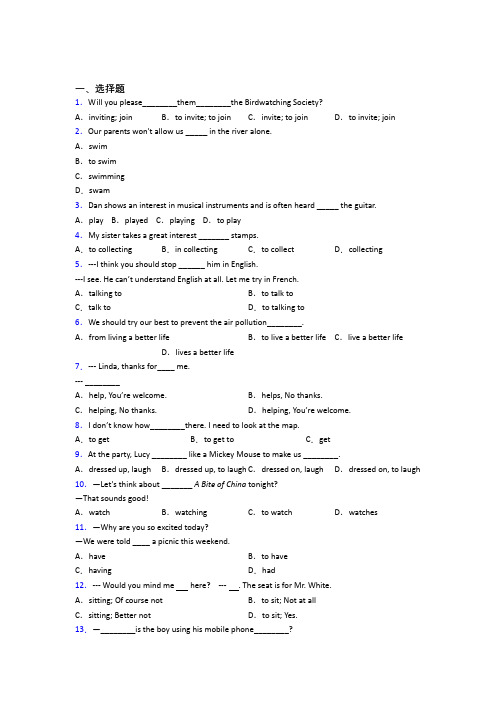
一、选择题1.Will you please________them________the Birdwatching Society?A.inviting; join B.to invite; to join C.invite; to join D.to invite; join 2.Our parents won't allow us _____ in the river alone.A.swimB.to swimC.swimmingD.swam3.Dan shows an interest in musical instruments and is often heard _____ the guitar.A.play B.played C.playing D.to play4.My sister takes a great interest _______ stamps.A.to collecting B.in collecting C.to collect D.collecting5.---I think you should stop ______ him in English.---I see. He can’t understand English at all. Let me try in French.A.talking to B.to talk toC.talk to D.to talking to6.We should try our best to prevent the air pollution________.A.from living a better life B.to live a better life C.live a better lifeD.lives a better life7.--- Linda, thanks for____ me.--- ________A.help, You’re welcome.B.helps, No thanks.C.helping, No thanks. D.helping, You’re welcome.8.I don’t know how________there. I need to look at the map.A.to get B.to get to C.get9.At the party, Lucy ________ like a Mickey Mouse to make us ________.A.dressed up, laugh B.dressed up, to laugh C.dressed on, laugh D.dressed on, to laugh 10.—Let's think about _______ A Bite of China tonight?—That sounds good!A.watch B.watching C.to watch D.watches 11.—Why are you so excited today?—We were told ____ a picnic this weekend.A.have B.to haveC.having D.had12.--- Would you mind me here? --- . The seat is for Mr. White.A.sitting; Of course not B.to sit; Not at allC.sitting; Better not D.to sit; Yes.13.—________is the boy using his mobile phone________?—________for information.A.Why; / ; Search B.Why; for; To searchC.What; for; Searching D.What; for; To search14.We should do everything we can________the endangered birds.A.protect B.protecting C.to protect D.protected 15.—It’s twelve o’clock.—It’s time________.A.to lunch B.to have lunch C.lunch D.to has lunch 16.The boy didn’t get an education so he has problems________ a job.A.to find B.finding C.find D.found17.—I saw Lucy go to Miss Zhang’s home just now.—Yes, she is often seen Miss Zhang with her housework.A.to help B.helps C.helping18.— What do you use MP3 for?— I ________ it ________ to music.A.use; listen B.are listening; listeningC.use; to listen D.is listening; to listening19.—It’s so hot here . Do you mind _____the window ?.—_____. I will do it right now .A.to close ; Yes B.to open ; NoC.opening ; Of course not D.closing ; I hope so20.Tom plans to Australia this summer but I would like America.A.to go, visiting B.to go, to visit C.going, to visit21.All the kids couldn’t help up when they heard the exciting news.A.jump B.to jump C.jumping D.jumped 22.—Each year, ________fishes are killed by the________water.—So we should do something to stop it!A.million of; polluting B.two millions; pollutedC.millions of; polluted D.two million; polluting23.Our class teacher told us ________ in the playground now for it is wet now.A.to play B.not to play C.played D.don’t play 24.Class Four plans________ a meeting about the school art festival tomorrow.A.have B.to have C.has D.are having 25.(2015·河南)Whenever we kids come over,Auntie Susan just stands there and watches us ________ sure we don't break anything.A.make B.madeC.to make D.making26.The menu has so many good things! I can’t decide ____.A.what to eat B.how to eatC.where to eat D.when to eat27.The winter holiday is coming. I really expect ________ a trip to Hong Kong.A.take B.taking C.to take 28.(2016·老河口期考)—What did the guard say to you just now?—He warned us_______any farther. There's danger ahead.A.didn't walk B.not to walk C.walk D.to walk【参考答案】***试卷处理标记,请不要删除一、选择题1.C解析:C【解析】【分析】【详解】句意:你能邀请他们加入观鸟协会吗?考查非谓语动词。
非谓语动词知识点总结

非谓语动词知识点总结非谓语动词是英语语法中的一个重要知识点,它可以用来修饰主语或宾语,增强句子的表达力和信息量。
在本文中,我将详细介绍非谓语动词的用法和一些常见的形式。
希望通过本文的阅读,读者能够更好地理解和运用非谓语动词,提高自己的英语写作水平。
一、非谓语动词的定义和分类非谓语动词是指在句子中充当动词的成分,但不具备谓语的功能。
它不受主语的人称和数的限制,也不受时态的影响。
根据其形式和功能的不同,非谓语动词可以分为动名词、不定式和分词三种形式。
1. 动名词(Gerund)动名词是动词加上-ing形式构成的名词,常用作主语、宾语、表语、宾补等。
例如:- Smoking is harmful to health.(吸烟对健康有害)- I enjoy swimming in the sea.(我喜欢在海里游泳)- His hobby is playing basketball.(他的爱好是打篮球)2. 不定式(Infinitive)不定式是动词的原形加上to构成的形式,常用作动词、形容词或名词的补语。
例如:- He wants to buy a new car.(他想买一辆新车)- I have a lot of work to do.(我有很多工作要做)- The book is too heavy to carry.(这本书太重,无法携带)3. 分词(Participle)分词是动词的-ing形式(现在分词)或-ed、-en等形式(过去分词)构成的形容词,常用作定语、状语或补语。
例如:- The running water is very clear.(流动的水非常清澈)- The broken vase has been repaired.(打破的花瓶已经修好了)- We were surprised by the exciting news.(令人兴奋的消息让我们感到惊讶)二、非谓语动词的用法非谓语动词在句子中具有独立的语法功能,可以用来修饰名词、代词、动词、形容词和副词等,以及构成复合句的各种从句。
初中英语非谓语动词总复习加练习及答案

非谓语动词重要考点:一、不定式;-ing形式;-ed形式二、省略to的不定式;三、带to与不带to意思不同的情况;四、只用-ing做宾语的动词五、只用to的不定式做宾语的动词在句子中充当除谓语以外的句子成分的动词形式叫做非谓语动词。
具体含义为在句中起名词,形容词或副词作用的动词形式,而不是作谓语的动词形式。
谓语动词和非谓语动词的区别:1) 谓语动词在句中可单独作谓语,而非谓语动词不能单独作谓语。
Miss Mary teaches us English. 玛丽教我们英语。
(teaches 动词作谓语)Mr. Li came to our classroom to have a talk with us last week.(to have a talk.... 不定式作状语)2) 谓语动词受主语的人称和数的限制,而非谓语动词形式没有这种限制。
Mike likes the pop music. (动词用单数第三人称形式)Lucy has nothing to do today。
(do 用原形)非谓语动词分为三种形式:不定式,动名词和分词(分词包括现在分词和过去分词)。
1)不定式时态\语态主动被动一般式to do to be done完成式to have done to have been done2)动名词时态\语态主动被动一般式doing being done完成式having done having been done3)分词时态\语态主动被动一般式doing being done完成式having done having been done否定形式:not +不定式,not + 动名词,not + 现在分词动词不定式一、结构及特征:1、动词不定式的基本形式是“to + 动词原形”,有时可以不带to。
2、特点:动词不定式没有人称和数的变化,在句子中不能作谓语,但可以担任除谓语外的任何成分——主语、表语、宾语、状语和宾语补足语,所以我们又称之为非谓语形式。
初中英语语法知识复习集之非谓语动词
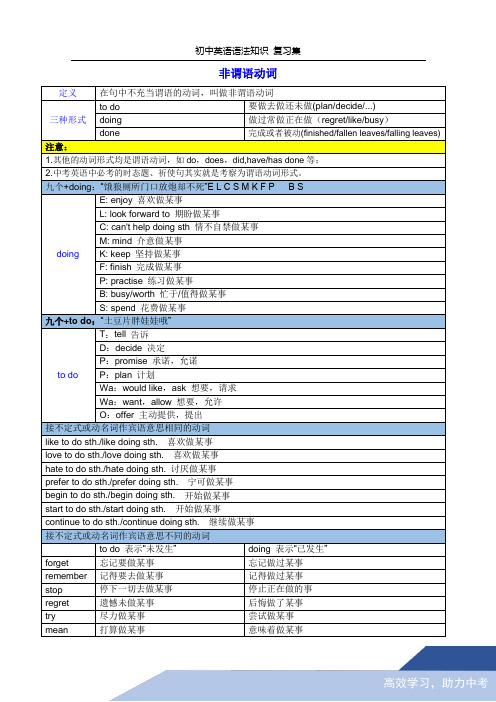
非谓语动词定义在句中不充当谓语的动词,叫做非谓语动词三种形式to do 要做去做还未做(plan/decide/...)doing 做过常做正在做(regret/like/busy)done 完成或者被动(finished/fallen leaves/falling leaves)注意:1.其他的动词形式均是谓语动词,如do,does,did,have/has done等;2.中考英语中必考的时态题、祈使句其实就是考察为谓语动词形式。
九个+doing:“饿狼厕所门口放炮却不死”E L C S M K F P B Sdoing E: enjoy 喜欢做某事L: look forward to 期盼做某事C: can't help doing sth 情不自禁做某事M: mind 介意做某事K: keep 坚持做某事F: finish 完成做某事P: practise 练习做某事B: busy/worth 忙于/值得做某事S: spend 花费做某事九个+to do:“土豆片胖娃娃哦”to do T:tell 告诉D:decide 决定P:promise 承诺,允诺P:plan 计划Wa:would like,ask 想要,请求Wa:want,allow 想要,允许O:offer 主动提供,提出接不定式或动名词作宾语意思相同的动词like to do sth./like doing sth. 喜欢做某事love to do sth./love doing sth. 喜欢做某事hate to do sth./hate doing sth. 讨厌做某事prefer to do sth./prefer doing sth. 宁可做某事begin to do sth./begin doing sth. 开始做某事start to do sth./start doing sth. 开始做某事continue to do sth./continue doing sth. 继续做某事接不定式或动名词作宾语意思不同的动词to do 表示“未发生”doing 表示“已发生”forget 忘记要做某事忘记做过某事remember 记得要去做某事记得做过某事stop 停下一切去做某事停止正在做的事regret 遗憾未做某事后悔做了某事try 尽力做某事尝试做某事mean 打算做某事意味着做某事can't help 不能帮助做某事情不自禁做某事go on 做完某事后接着做另一件事继续做同一件事动词不定式省略to的三种情况1.使役动词使/让某人做某事使/让某人....make make sb do sth make sb+ adjlet let sb do sth let sb +adj2.感官实义动词doing 表示“正发生;反复的动作”do表示“经常发生;动作全过程”see 看见某人正在做某事看见某人经常做某事/全过程watch 看见某人正在做某事看见某人经常做某事/全过程hear 听见某人正在做某事听见某人经常做某事/全过程notice 注意到某人正在做某事听见某人经常做某事/全过程3.had better(not)do sth最好做某事/would rather(not)do sth宁愿做某事4.help to (do) sth注意:在用于被动语态时,to要还原She is made to our monitor.动词不定式to do 的用法①作主语It’s nice to hear from you.②作宾语I forgot to lock the door.③作宾补He ordered her to leave at once.④作表语My job is to pick up letters.⑤作定语He is always the first one to get there.⑥作状语常常翻译成“为了...”。
非谓语动词例题讲解及练习
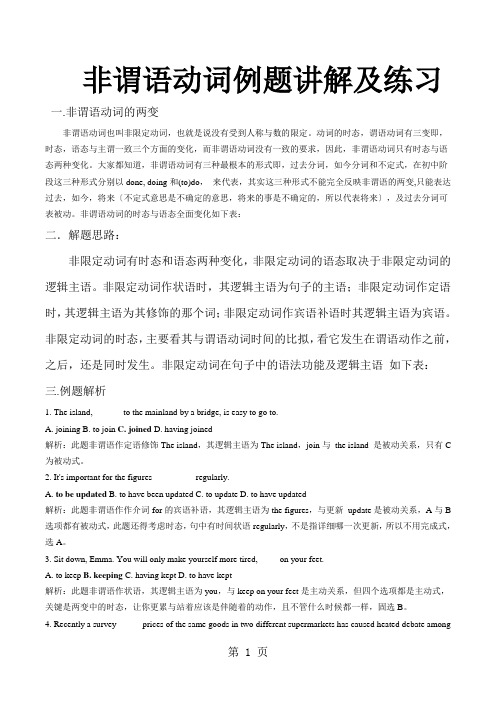
非谓语动词例题讲解及练习一.非谓语动词的两变非谓语动词也叫非限定动词,也就是说没有受到人称与数的限定。
动词的时态,谓语动词有三变即,时态,语态与主谓一致三个方面的变化,而非谓语动词没有一致的要求,因此,非谓语动词只有时态与语态两种变化。
大家都知道,非谓语动词有三种最根本的形式即,过去分词,如今分词和不定式,在初中阶段这三种形式分别以done, doing和(to)do,来代表,其实这三种形式不能完全反映非谓语的两变,只能表达过去,如今,将来〔不定式意思是不确定的意思,将来的事是不确定的,所以代表将来〕,及过去分词可表被动。
非谓语动词的时态与语态全面变化如下表:二.解题思路:非限定动词有时态和语态两种变化,非限定动词的语态取决于非限定动词的逻辑主语。
非限定动词作状语时,其逻辑主语为句子的主语;非限定动词作定语时,其逻辑主语为其修饰的那个词;非限定动词作宾语补语时其逻辑主语为宾语。
非限定动词的时态,主要看其与谓语动词时间的比拟,看它发生在谓语动作之前,之后,还是同时发生。
非限定动词在句子中的语法功能及逻辑主语如下表:三.例题解析1. The island, ______ to the mainland by a bridge, is easy to go to.A. joiningB. to joinC. joinedD. having joined解析:此题非谓语作定语修饰The island,其逻辑主语为The island,join与the island 是被动关系,只有C 为被动式。
2. It's important for the figures _________ regularly.A. to be updatedB. to have been updatedC. to updateD. to have updated解析:此题非谓语作作介词for的宾语补语,其逻辑主语为the figures,与更新update是被动关系,A与B 选项都有被动式,此题还得考虑时态,句中有时间状语regularly,不是指详细哪一次更新,所以不用完成式,选A。
(完整版)非谓语动词语法讲解及练习
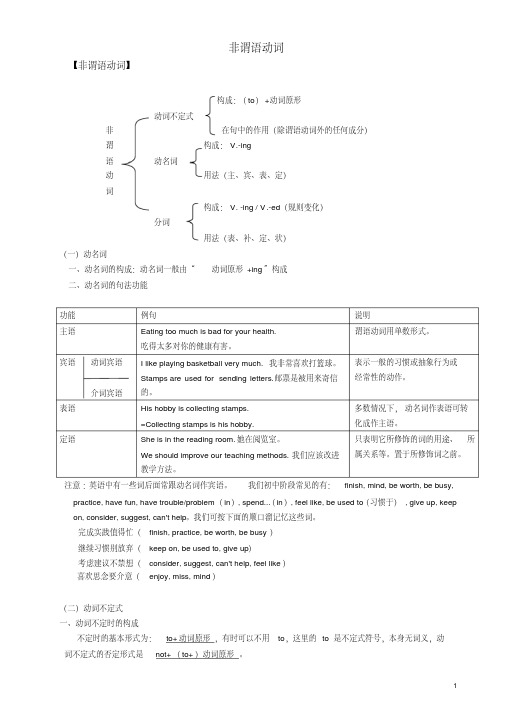
非谓语动词【非谓语动词】构成:(to)+动词原形动词不定式非在句中的作用(除谓语动词外的任何成分)谓构成:V.-ing语动名词动用法(主、宾、表、定)词构成:V. -ing / V.-ed(规则变化)分词用法(表、补、定、状)(一)动名词一、动名词的构成:动名词一般由“动词原形+ing”构成二、动名词的句法功能功能例句说明主语Eating too much is bad for your health.吃得太多对你的健康有害。
谓语动词用单数形式。
宾语动词宾语介词宾语I like playing basketball very much.我非常喜欢打篮球。
Stamps are used for sending letters.邮票是被用来寄信的。
表示一般的习惯或抽象行为或经常性的动作。
表语His hobby is collecting stamps.=Collecting stamps is his hobby. 多数情况下,动名词作表语可转化成作主语。
定语She is in the reading room.她在阅览室。
We should improve our teaching methods.我们应该改进教学方法。
只表明它所修饰的词的用途、所属关系等。
置于所修饰词之前。
注意:英语中有一些词后面常跟动名词作宾语。
我们初中阶段常见的有:finish, mind, be worth, be busy, practice, have fun, have trouble/problem(in), spend...(in), feel like, be used to(习惯于), give up, keep on, consider, suggest, can't help。
我们可按下面的顺口溜记忆这些词。
完成实践值得忙(finish, practice, be worth, be busy)继续习惯别放弃(keep on, be used to, give up)考虑建议不禁想(consider, suggest, can't help, feel like)喜欢思念要介意(enjoy, miss, mind)(二)动词不定式一、动词不定时的构成不定时的基本形式为:to+动词原形,有时可以不用to,这里的to 是不定式符号,本身无词义,动词不定式的否定形式是not+(to+)动词原形。
初中英语语法知识—动词的技巧及练习题附答案(4)
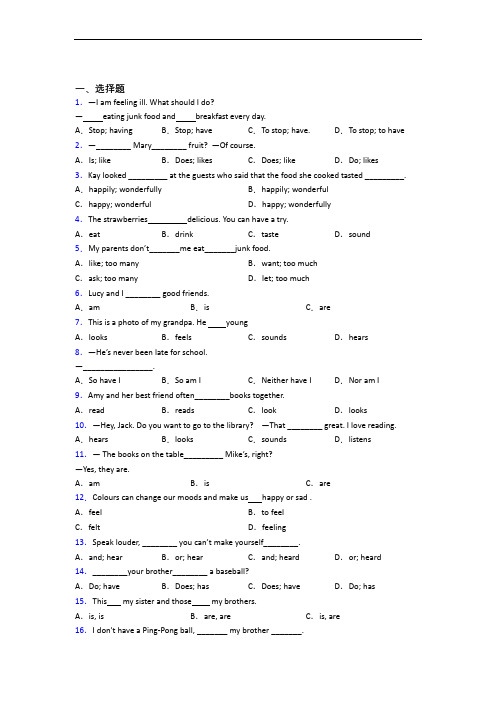
一、选择题1.—I am feeling ill. What should I do?— eating junk food and breakfast every day.A.Stop; having B.Stop; have C.To stop; have. D.To stop; to have 2.—________ Mary________ fruit? —Of course.A.Is; like B.Does; likes C.Does; like D.Do; likes 3.Kay looked _________ at the guests who said that the food she cooked tasted _________. A.happily; wonderfully B.happily; wonderfulC.happy; wonderful D.happy; wonderfully4.The strawberries delicious. You can have a try.A.eat B.drink C.taste D.sound5.My parents don’t_______me eat_______junk food.A.like; too many B.want; too muchC.ask; too many D.let; too much6.Lucy and I ________ good friends.A.am B.is C.are7.This is a photo of my grandpa. He youngA.looks B.feels C.sounds D.hears 8.—He’s never been late for school.—________________.A.So have I B.So am I C.Neither have I D.Nor am I 9.Amy and her best friend often________books together.A.read B.reads C.look D.looks 10.—Hey, Jack. Do you want to go to the library? —That ________ great. I love reading. A.hears B.looks C.sounds D.listens 11.—The books on the table_________ Mike’s, right?—Yes, they are.A.am B.is C.are12.Colours can change our moods and make us happy or sad .A.feel B.to feelC.felt D.feeling13.Speak louder, ________ you can’t make yourself________.A.and; hear B.or; hear C.and; heard D.or; heard 14.________your brother________ a baseball?A.Do; have B.Does; has C.Does; have D.Do; has 15.This my sister and those my brothers.A.is, is B.are, are C.is, are16.I don't have a Ping-Pong ball, _______ my brother _______.A.but; do B.and; does C.and;do D.but; does17.In fact (事实上), she ________ ________ many ________.A.doesn’t has; toies B.don’t has; toies C.doesn’t have; t oys D.don’t have; toys 18.Their eyes __________blue, but ours_________black.A.are; are B.is; are C.are; is . D.are; is19.The baby is crying. Her brother tries her best to make her ______A.to laugh B.laugh C.laughing D.laughed 20.The water ______ cool when I jumped into the pool for morning exercise.A.was felt B.is felt C.felt D.feels21.--Lucy______her mother and her mother______very young.A.looks like; looks like B.looks like; looksC.looks; looks like D.looks; looks22.I don’t have a baseball, but my brother_________.A.is B.has C.does23.Peter has never seen such a big fish in his life, ________?A.has he B.hasn’t he C.does he D.doesn't he 24.Mike and Jeff________ TV on weekdays.A.doesn't watch B.don't watch C.watches D.not watch 25.—Where_______you come from?—I______from JapanA.are; am B.are; come C.do; come【参考答案】***试卷处理标记,请不要删除一、选择题1.B解析:B【解析】【分析】【详解】句意:——我感觉生病了。
- 1、下载文档前请自行甄别文档内容的完整性,平台不提供额外的编辑、内容补充、找答案等附加服务。
- 2、"仅部分预览"的文档,不可在线预览部分如存在完整性等问题,可反馈申请退款(可完整预览的文档不适用该条件!)。
- 3、如文档侵犯您的权益,请联系客服反馈,我们会尽快为您处理(人工客服工作时间:9:00-18:30)。
一、选择题1.—Why are you so excited today?—We were told ____ a picnic this weekend.A.have B.to haveC.having D.had2.—You don’t know what great difficulty I had ________ to get the two tickets.—But the film is really worth _________ twice.A.managing; seeing B.to manage; seeingC.managing; being seen D.managed; to see3.My mom wants________a new Jacket________me.A.to buy;to B.to buy: for C.buy; for4.________TV too much is bad for your eyes.A.Watching B.Watch C.Watches D.Watched 5.The snow makes them______ cold, so they want to make a fire_______ warm.A.feel , to keep B.to feel, keep C.feel, keep D.to feel ,to keep 6.When I came into the room, I saw a cat ______ under the table.A.to lie B.lies C.to lying D.lying7.---I think you should stop ______ him in English.---I see. He can’t understand English at all. Let me try in French.A.talking to B.to talk toC.talk to D.to talking to8.We should try our best to prevent the air pollution________.A.from living a better life B.to live a better life C.live a better lifeD.lives a better life9.The opera is very difficult. I hope ________ more next time.A.understand B.understanding C.to understand D.understood 10.It's necessary ___________ us ___________ some good books.A.for; read B.to; to read C.for; to read D.to; read11.I don’t know how________there. I need to look at the map.A.to get B.to get to C.get12.—It’s too hot. Would you mind my________ the window?— ________, please do it now.A.to open; OK B.opening; Certainly not C.opening; Of course D.to open; Good idea13.—I didn't hear you come in just now.—That's good. We tried________any noise, for you were sleeping.A.not make B.not to make C.to make D.making 14.—Are you good at ________ football?—Yes, I ________.A.play;can B.playing;can C.play;am D.playing;am 15.I found it necessary _______ each other in friendship.A.trusts B.to trust C.trusting 16.(2016·老河口期考)—What did the guard say to you just now?—He warned us_______any farther. There's danger ahead.A.didn't walk B.not to walk C.walk D.to walk 17.Will you please________them________the Birdwatching Society?A.inviting; join B.to invite; to join C.invite; to join D.to invite; join 18.— Have you considered ________Robert some help?— Yeah. I have already promised to lend him some money.A.give B.to give C.giving D.to giving 19.—I saw Lucy go to Miss Zhang’s home just now.—Yes, she is often seen Miss Zhang with her housework.A.to help B.helps C.helping 20.Thank you for________us so well, Mr. Wang.A.teaches B.teaching C.teach D.to teach 21.It’s t ime _________ now.A.go B.to go C.go to22.—Did you get Sam’s invitation?—Yes. But I was so busy today that I almost forgot________to his invitation. A.replying B.to answer C.to reply23.It only __________ him 20 minutes __________ to his office every day. A.takes;to drive B.take;drive C.takes;drive 24.—Each year, ________fishes are killed by the________water.—So we should do something to stop it!A.million of; polluting B.two millions; pollutedC.millions of; polluted D.two million; polluting25.Class Four plans________ a meeting about the school art festival tomorrow. A.have B.to have C.has D.are having 26.—Why did his car run into the tree?— hitting the little boy.A.To avoid B.Avoid C.Avoiding D.Avoided 27.The menu has so many good things! I ca n’t decide ____.A.what to eat B.how to eatC.where to eat D.when to eat28.—Let him __________us to learn English, OK? —Great!A.Helps B.to help C.help D.helping【参考答案】***试卷处理标记,请不要删除一、选择题1.B解析:B【解析】【分析】【详解】句意:——你今天为什么这么兴奋?——我们被告知这个周末去野餐。
考查非谓语动词。
tell sb. to do sth:告诉某人做某事;sb be told to do sth:某人被告诉要做某事(被动语态)。
故选B。
2.A解析:A【解析】【分析】【详解】试题分析: 句意:---你不知道我试图得到两张票有多大的困难。
---但是电影值得看两遍。
此题考查固定短语have difficulty doing sth 做某事有困难,be worth doing事值得做;根据句意,故选A。
3.B解析:B【解析】【分析】【详解】句意:我的妈妈想给我买一件新的夹克衫。
考查动词不定式以及动词接双宾语结构。
to buy买,buy的动词不定式结构;buy买;for 为、给。
结合句意和选项,可知第一个空格应该根据“want to do sth”来做题。
故第一个空格应该填to buy;根据“buy sth for sb.”,可知第二格空格应该填介词for。
故选B。
【点睛】结合动词的常用结构做题,有时让我们解题速度大大加快。
比如本题,如果我们很熟悉want to do sth以及buy sth for sb.,我们就可以快速找到答案B。
4.A解析:A【解析】【分析】【详解】句意:看太多电视对你的眼睛不好。
考查非谓语动词。
Watching观看,动名词;Watch动词原形;Watches动词第三人称单数形式;watched过去式或过去分词形式。
根据句子结构可知,… TV too much是该句的主语,应用动名词形式。
故选A。
5.A解析:A【解析】句意:雪让他们感觉得很冷,所以他们想生火取暖。
make sb.do sth.让某人做某事,make使役动动词,后接动词原形,排除B和D; make a fire生火,"生火的目的是取暖",这里要用动词不定式短语作目的状语,排除C;故答案选A。
6.D解析:D【解析】【分析】【详解】句意:当我进入房间的时候,我看到一只猫趴在桌子下面。
考查非谓语动词。
lie 躺着,位于;lying是lie的现在分词。
看到在干什么,表示一种状态,要用动词的分词形式。
如果动作的被动的,用过去分词,如果是主动的,则用现在分词。
